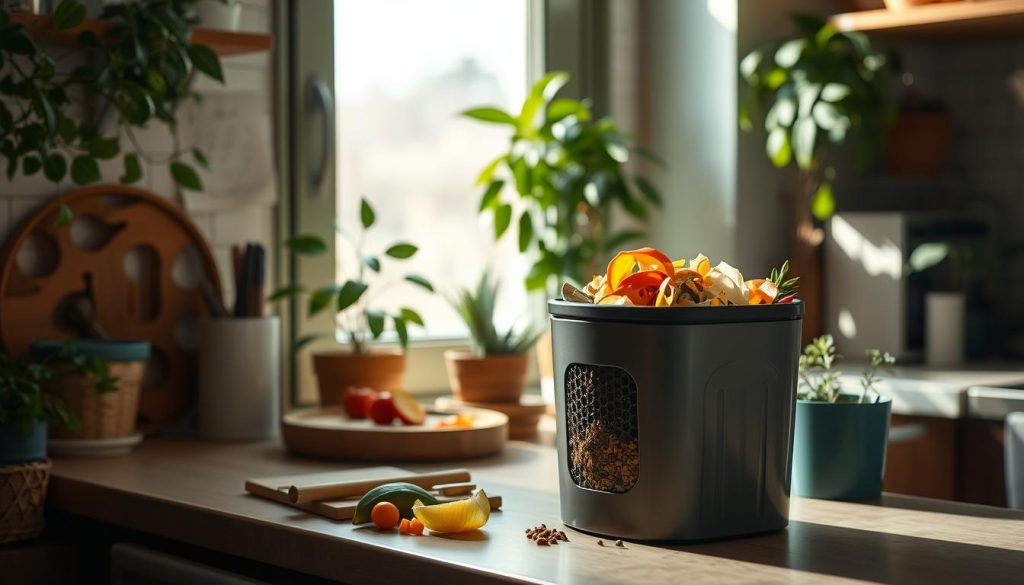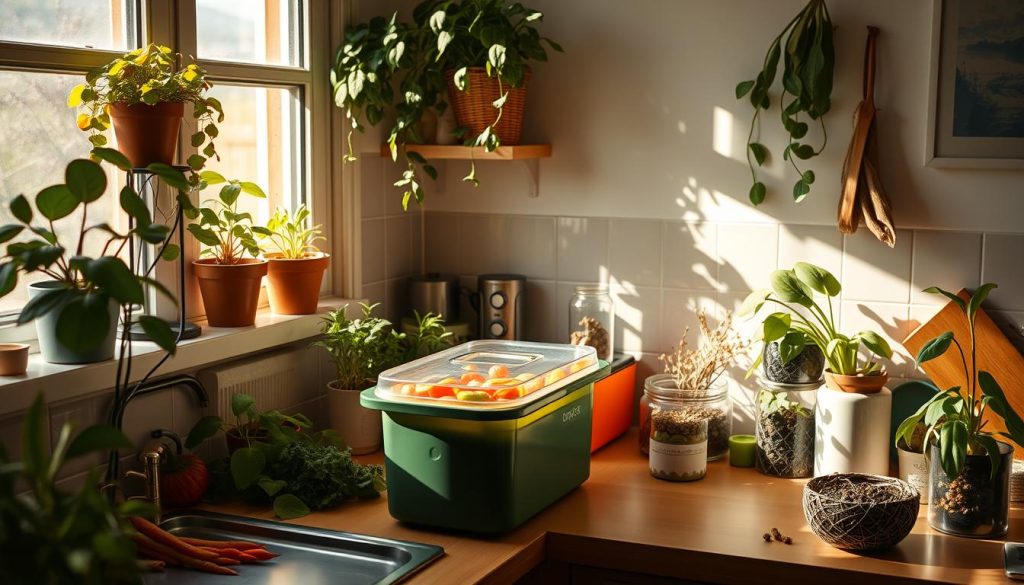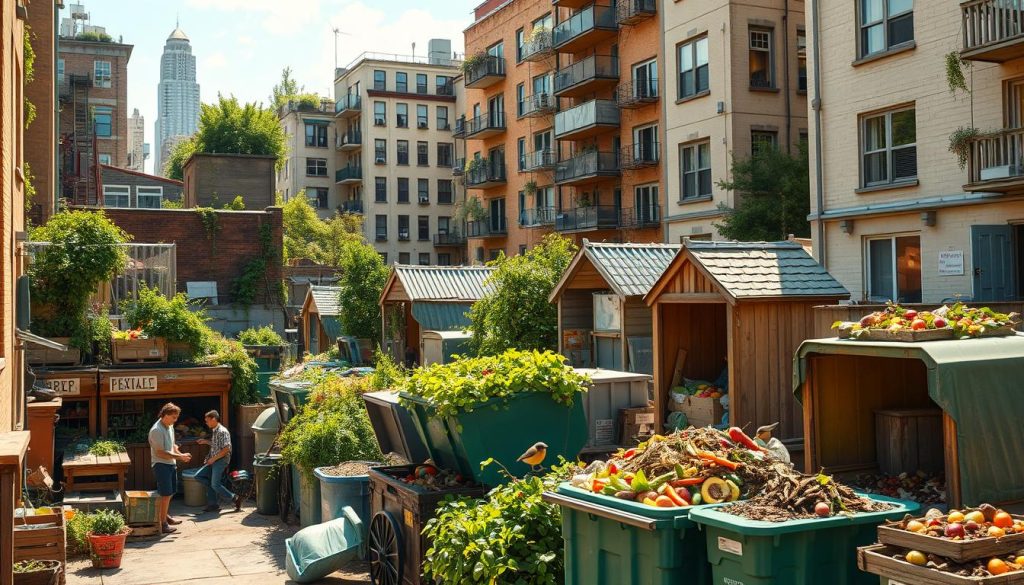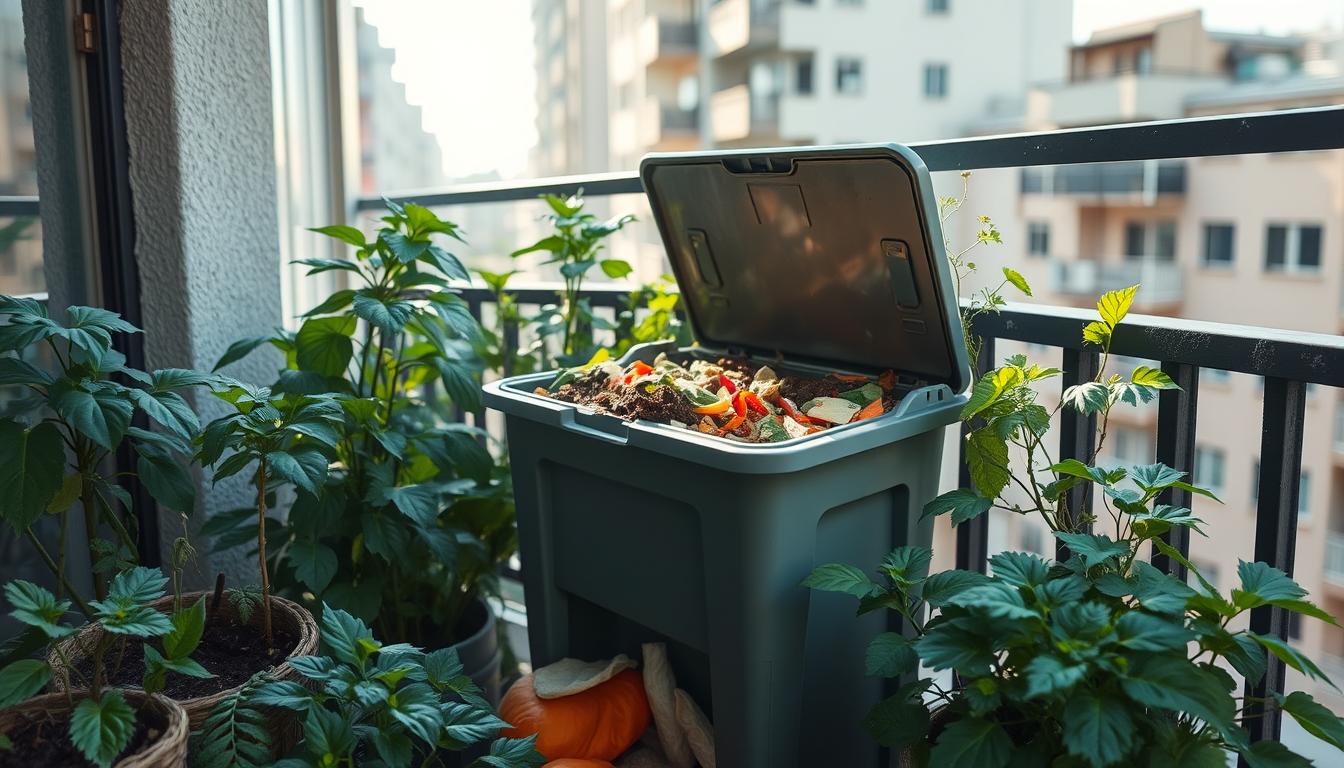I started composting without a backyard, and it changed my life. It’s easier than you think to compost without a yard. It helps reduce waste and makes our environment more sustainable.
I live in an apartment, but I learned that composting is possible here too. With a bit of creativity, you can turn food scraps into soil. This soil is great for indoor plants or small balcony gardens.
Composting is key to reducing our environmental impact. It’s not just for those with big yards. To compost without a backyard, you need to plan a bit. But it’s worth it to reduce waste and create something valuable.
In this article, I’ll share my apartment composting journey. I’ll also give tips on starting composting without a backyard.
Understanding Composting Basics
Exploring composting is exciting. It’s a way to turn organic waste into a valuable soil amendment. This is key for both indoor and urban composting, helping to reduce waste and enrich gardens.
Composting is a simple yet powerful act. It helps us reduce landfill waste and creates a nutrient-rich soil for our gardens. This is done by breaking down food waste and yard trimmings.
What is Composting?
Composting is a natural process. Microorganisms break down organic materials into a stable substance. It needs the right mix of carbon, nitrogen, moisture, and air.
Benefits of Composting
Composting offers many benefits. It reduces waste, creates nutrient-rich soil, and fights climate change. It also saves water, cuts down on synthetic fertilizers, and promotes healthy plant growth.

Composting Materials: What to Use
Choosing the right materials for composting is important. Food waste, yard trimmings, and paper products are great. They have the right mix of carbon and nitrogen for a balanced compost pile.
Composting Options for Apartment Dwellers
Living in an apartment doesn’t mean you can’t compost. There are many ways to compost, even without a backyard. You can use your balcony or a small indoor space to turn food scraps into soil.
Worm bins are a popular choice for indoor composting. They’re easy to use and fun to watch. Bokashi composting is another quick method. It uses microorganisms to break down food scraps, making it perfect for small spaces.

Indoor Composting Methods
- Worm bins: a great option for small spaces, as they’re compact and low-maintenance
- Bokashi composting: a quick and easy way to compost food scraps, using microorganisms to break down the scraps
- Indoor composting bins: a great option for those who want to compost without the hassle of worms or microorganisms
Worm Bins: My Favorite Option
Worm bins are my top pick for composting. They’re perfect for small spaces and are easy to care for. The worms do all the work, and the compost is great for indoor plants.
Bokashi Composting: Quick and Easy
Bokashi composting is another excellent choice for small spaces. It’s fast and simple, ideal for those who don’t want to deal with worms or outdoor bins. This method breaks down scraps quickly, reducing waste and creating rich soil.
Choosing the Right Composting System
Choosing the right composting system can be tough, especially in a city. You need to think about your lifestyle, space, and composting needs. Composting in a city means managing waste well to make nutrient-rich soil.
First, look at different compost bins like plastic, metal, and wooden ones. Each has its own good and bad points. For instance, plastic bins are cheap and easy to clean. Metal bins are durable and keep pests out. Wooden bins look nice but need more care.
Comparing Compost Bins
- Plastic bins: affordable, easy to clean, and lightweight
- Metal bins: durable, pest-resistant, and can be more secure
- Wooden bins: aesthetically pleasing, can be more expensive, and require maintenance
You can also try DIY composting. Using old pallets or wire mesh is a cheap and creative way. Think about the bin’s size and the space you have. A big bin is good for a big garden, while a small bin works for a small space.

Size Matters: Finding the Best Fit
The secret to good kitchen composting is finding a system that matches your life. By looking at your options and picking the right system, you can cut down waste. You’ll also make nutrient-rich soil and help the planet.
Maintaining Your Composting Setup
Exploring composting without outdoor space has taught me a lot. Keeping your composting setup in good shape is key to success. It’s important to watch moisture levels and turn the compost to keep it healthy.
Checking moisture in your compost pile is a must. You can do this by feeling the materials and adding water or dry stuff as needed. Turning the compost regularly helps it breathe and decompose faster. I turn mine every few days to keep it smelling fresh.
Tips for Maintaining Your Compost
- Monitor moisture levels regularly to ensure the compost pile is not too dry or too wet
- Turn the compost every few days to aerate the pile and speed up decomposition
- Add bulking agents, such as straw or shredded newspaper, to absorb excess moisture and reduce odors
By following these tips, you can make a great compost pile, even in a small space. Remember to keep an eye on moisture and turn the compost. This will make your composting journey both successful and fun.
Using Compost in Urban Gardening
I’m excited to share how composting has changed my urban gardening. It’s made gardening in small spaces easier. Using compost improves soil, makes nutrients available, and boosts plant growth.
Compost is a natural fertilizer. It reduces waste, saves water, and enriches soil. I mix it into potting soil or use it as a top dressing. This simple step greatly benefits my plants.
Preparing Compost for Use
To use compost, I check if it’s fully broken down and smells earthy. Then, I mix it into potting soil or use it as a top dressing. This improves soil quality and feeds my plants well.
Container Gardening with Compost
Compost is great for container gardening. It saves space and reduces waste. It improves soil, retains water, and boosts plant growth.
- Improved soil structure
- Increased water retention
- Enhanced plant growth
Compost has greatly improved my urban garden. It’s easy and effective for any gardener. Using compost makes your garden sustainable and thriving.
Helpful Resources and Communities
As you keep going on your composting path, having support and info is key. Joining local composting groups is a smart move. It lets you meet others, learn new things, and keep up with composting news.
Finding Local Composting Groups
Look up your city or town’s environmental department for composting groups. These groups often host workshops, share resources, and give discounts on compost bins or worm bins.
Online Forums and Support
When you can’t go to events, online forums and social media groups are great. They let you ask questions, share wins, and learn from others’ composting journeys.
Educational Videos and Blogs I Love
Check out the EPA’s Composting at Home page, the Compost Council of Canada’s blog, and YouTube channels like Gardener Scott. They offer lots of educational content, like guides, tips, and stories. These resources really help me grow my composting skills and stay inspired.
By using these resources and joining communities, you can keep improving at composting. You’ll make a big difference for the environment, bit by bit.

